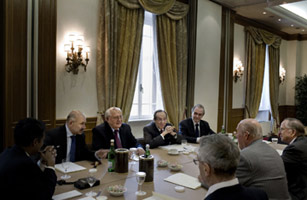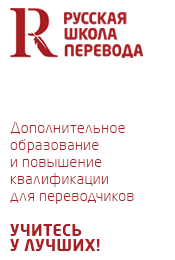Gorbachev, Shultz, Nunn, Perry Urge a Nuclear-Free World
By Romesh Ratnesar
Опубликовано 22 апреля 2009 г.
в журнале TIME
Конференция в Риме «Преодоление ядерной опасности», в которой я участвовал вместе с М.С.Горбачевым, вызвала необычный для таких форумов отклик в прессе. Интервью в журнале «Тайм» характерно, среди прочего, тем, что слова участников, в том числе переведенные, фактически не редактируются. «Цена слова» довольно велика.

DISARMING DISCUSSION: TIME's roundtable, which included former Soviet leader Gorbachev (third from left), agreed that greater cooperation between Washington and Moscow on nuclear weapons is vital
Photograph for TIME by Kathryn Cook / Agence VU
President Obama's call for a "world without nuclear weapons," and his agreement with Russian President Dmitri Medvedev to work towards just that, have helped revive an issue that slipped off the foreign-policy agenda following the end of the Cold War two decades ago. But nuclear disarmament hasn't been completely forgotten in recent years. In 2007, four diplomatic heavyweights — former U.S. Secretaries of State George Shultz and Henry Kissinger, former Secretary of Defense William Perry and former Chairman of the Senate Armed Services Committee Sam Nunn — made an impassioned plea for a nuclear weapons-free world. Shultz, Perry and Nunn, along with former Soviet leader Mikhail Gorbachev, sat down with TIME's Deputy Managing Editor Romesh Ratnesar in Rome last week. (They were joined by one-time Soviet Foreign Minister Aleksandr Bessmertnykh and Gen. Vladimir Dvorkin.) The group discussed the chances for progress, Iran, North Korea and the threat of nukes falling into the hands of terrorists. Excerpts:
TIME: The idea of a a world without nuclear weapons is one that all four of you have been talking about for the last several years. Last month in Prague, President Obama made it a goal of his Administration's foreign policy. What was the significance of that?
Shultz: Before his speech in Prague, President Obama met in London with the president of the Russian Federation, President Medvedev, and they issued a joint statement in which they pledged the two countries to seek a world free of nuclear weapons. And so the Prague speech, which I thought was a stirring speech, was building on that statement.
I'm sitting across the table from President Gorbachev — twentysomething years ago at [the U.S.-Soviet summit in] Reykjavik, he and President Reagan made the same kind of statement. When I came home from Rejkyavik — you remember, Mr. President, Margaret Thatcher used to carry a little handbag — she came to Washington and summoned me to the British Ambassador's residence. And she handbagged me. She said, "George, how could you sit there and allow the president to agree to a world free of nuclear weapons?" And I said, "Well Margaret, he's the President....and I agreed with him!" But this time I think there is a very great receptiveness. I'd be interested in what the reaction has been in Russia.
Gorbachev: Let's be frank — the process of nuclear disarmament had slowed down. The members of the nuclear club were not showing a good example to the other countries. They had forgotten about their obligations under the Non-Proliferation Treaty, and quite naturally all of us were concerned about that situation. I think what the two presidents did...was received by knowledgeable people in Russia very positively. The most important thing is that the [arms-reduction] process is resuming, and I think that the overall response not only in our two countries but in the world, is positive. People are glad that this is happening. You said that this was an historic statement, and I agree with that.
TIME: So what's the next step?
Nunn: We are in what I call a "perfect storm" in terms of nuclear danger. You've got nuclear materials spread around the world. You've got the beginning of proliferation of enrichment by a number of countries — and not simply Iran and North Korea. You've got the spread of technology and know-how, and you've got terrorists who are willing to use these weapons if they get them.
I have about six or seven top priorities. If I had to list one that would be most important to the U.S. and Russia, it would be to find a way to work together on ballistic missile defense. Because if we can work together and get other countries to join us, and understand each other on defensive systems — what we're going to do or not do — then at some point we will conclude, why do we need all of these offensive forces that are a danger to not only our two countries, but to the globe? My second priority is one we've already undertaken, but we've got a long way to go, and that is to get nuclear materials secured, everywhere in the world. And that's something the U.S. and Russia should work as partners on together. We have worked together since the early nineties but we need to make that a global partnership and get others to join us.
TIME:Many countries, not just Iran and North Korea, but also Pakistan, India, Israel, view nuclear weapons not just as fundamental to their security but also to their national prestige. How do you get them to embrace this vision of a nuclear-free world? Can the vision be exported?
Perry: The vision can be exported, but not until the United States and Russia take a leadership position. The U.S. and Russia have 95% of the nuclear weapons in the world. The world will look to them to provide leadership. During the Cold War we built this huge store of nuclear weapons becuase we thought they protected our security. Today the same weapons that protected our security are now endangering our security. And the U.S. and Russia must lead the way in reducing that danger.
The Prague speech was indeed a remarkable moment. But that's just the beginning. When I point out the necessity of the U.S. and Russia providing leadership I don't mean to suggest that's all that is needed. That leadership is necessary to inspire the other countries to move as well. The U.S., and even the U.S. and Russia by themselves, cannot deal with this danger [alone.] It's a global problem and it requires a global solution.
- Войдите на сайт для отправки комментариев







Последние комментарии
5 лет 40 недель назад
5 лет 51 неделя назад
6 лет 28 недель назад
6 лет 47 недель назад
7 лет 8 недель назад
8 лет 32 недели назад
8 лет 32 недели назад
9 лет 2 недели назад
9 лет 2 недели назад
9 лет 13 недель назад